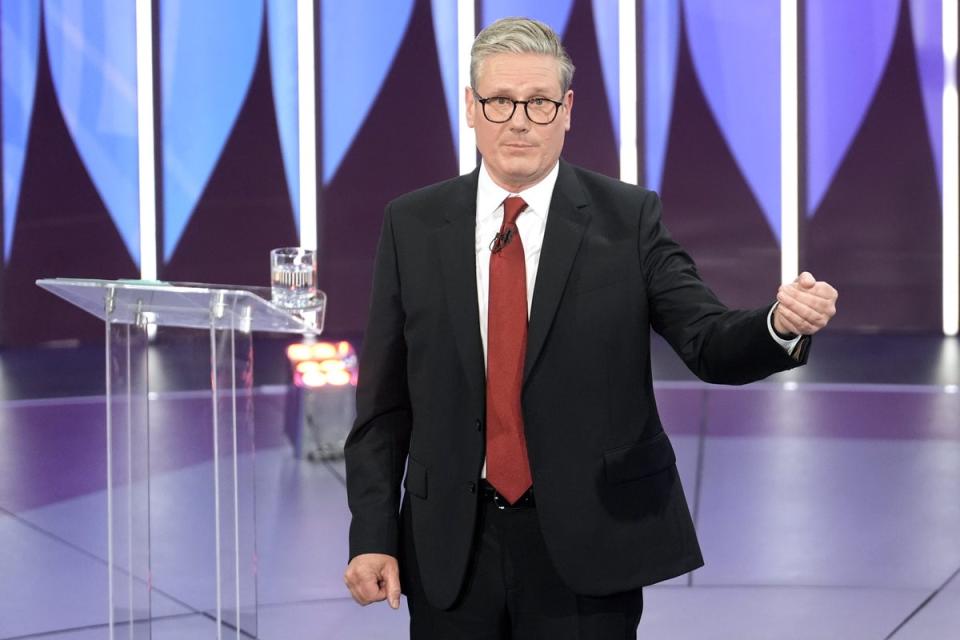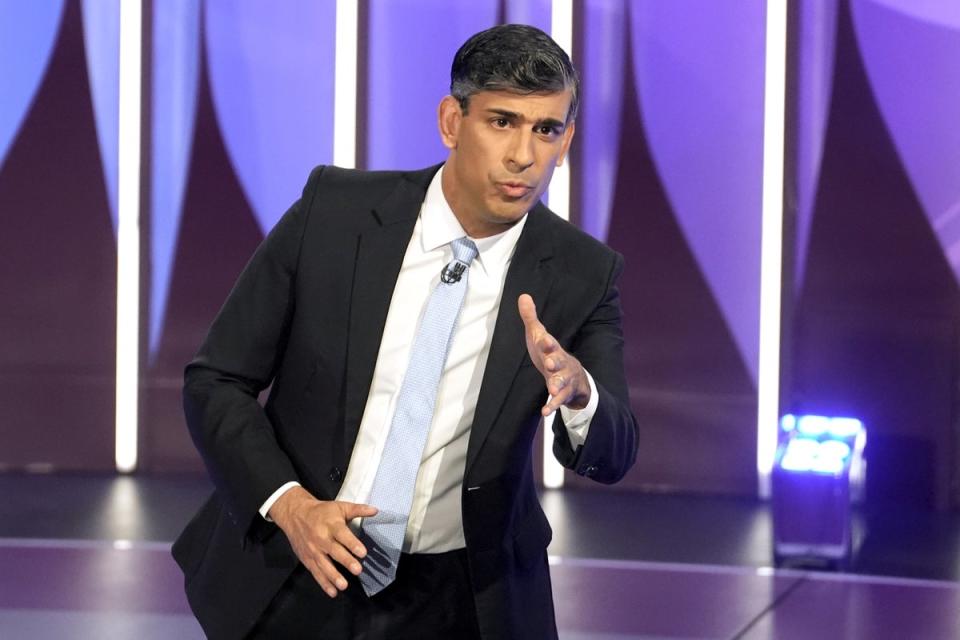Sunak ‘incredibly angry’ over gambling scandal but refuses to suspend candidates involved
Rishi Sunak confessed to being “incredibly angry” over members of his inner circle being caught up in a gambling scandal over bets on the date of the election.
But, as the prime minister faced a BBC Question Time audience with just two weeks of the election to go, he refused to suspend two candidates currently being investigated by the Gambling Commission.
In an extraordinary move on Friday, a cabinet minister was also forced to deny he had placed a bet on polling day just before it was announced by the prime minister.
Welsh Secretary David TC Davies said: “I just want to put on record that I certainly haven’t bet myself”.
He added he had “absolutely no idea” if any more names would emerge, amid fears the scandal will spread.
Betfair data appears to show a flurry of bets on a July poll placed on May 21, the day before Mr Sunak called the election, including some in the hundreds of pounds and at odds that would have delivered profits in the thousands.
With polls still pointing to a massive Labour majority and a Tory wipeout with many voters defecting to Reform, Mr Sunak needed his half-hour slot in the debate to be a platform to turn things around in the closing stages of the election campaign.
Instead he was confronted by the betting scandal which saw his director of campaigning Tony Lee “take a leave of absence”. Meanwhile, Mr Lee’s wife Laura Saunders, a candidate in Bristol who has worked for the party since 2015, and Craig Williams, his parliamentary private secretary, are all being investigated for placing bets just before Mr Sunak called his surprise snap election.

A tired and tense looking Mr Sunak looked exasperated as he was confronted with hostile questions on his own performance during the campaign, the scandal and other issues.
At the end of his 30 minutes he managed to attack members of the audience and was booed and catcalled with cries of “shame” over his promise to quit the European Convention on Human Rights (ECHR) if it prevented him from protecting the UK’s borders on migration.
He told the Question Time audience: “It was the right moment to call the election, for the reasons that I have outlined.”
Asked if he was glad to have called the election, he added: “I am.”
The prime minister, who attacked his predecessors Boris Johnson and Liz Truss several times, compared his current prospects to those he had during the Tory leadership contest of 2022 against Ms Truss.
In a defiant note on why he would not give up even with the polls stacked against him, Mr Sunak said: “Even though people didn’t want to hear it at the time, I kept going, I kept saying what I thought was right for this country, I kept going until the end and you know what? I was proved right then.
“And that is why you can trust me now when I say that what Keir Stammer is promising you is the same fantasy as Liz Truss did and it is just going to make your taxes go up and that matters to me because I don’t want that to happen.”

Mr Sunak, who was a Leave supporter in 2016, also defended Brexit. Asked if Brexit had denied young people a future, he said “we had a referendum, it’s time to get on”.
He said it is time to “make sure we realise all the benefits” of Brexit.
Earlier, Labour leader Sir Keir Starmer was challenged on the number of U-turns he has made and his integrity as a politician.
He was challenged over his previous support for Jeremy Corbyn and claims that he would make a great prime minister, which saw Sir Keir again try distance himself from his recent past.
The Labour leader said: “I am a common sense politician. I work through the issues and to me it did not make sense to nationalise energy and not get the bills down, so I decided we would go for getting the bills down.”
However, he refused to give a number or time frame for his pledge in bringing migration down.
He was also challenged on his treatment of Canterbury Labour candidate Rosie Duffield, who has been marginalised over her belief in protecting female biological rights.
Quizzed about his views on the definition of a woman, Sir Keir said he agreed with Sir Tony Blair’s recent comment that a woman has a vagina and a man has a penis.
Sir Keir said: “There are many people who don’t identify with the gender they are born into.”
The Labour leader said he wanted to “give dignity to everyone” and criticised Mr Sunak for a trans jibe allegedly linked to Brianna Ghey.
“I want to bring the country together,” he added, “during the pandemic people were looking out for each other.”
The first two up before the audience were Lib Dem leader Sir Ed Davey and SNP leader John Swinney.
Mr Davey faced tough questions about his record in the coalition years and as minister in the Horizon scandal, as grilling of the four main party leaders by members of the public kicked off.
Challenged by a student over the Lib Dems abandoning their pledge to scrap tuition fees in the coalition government, Sir Ed said: “I understand why your generation lost faith in us. It was a difficult government to be in.”
He said the loss of trust in his party after that period was “very scarring” and admitted he was “not proud” of some of the votes he had to take part in.
In the SNP leader’s session Fiona Bruce repeatedly challenged Mr Swinney on what it would mean for his democratic mandate for independence if the SNP failed to win a majority of Scottish seats in July given, she suggested, it would be a “democratic decision that you shouldn’t be pursuing independence”.
When he repeated that he wanted people in Scotland to confidently vote for the SNP so the party could turn its manifesto into reality, she voiced her conclusion that he was not going to answer the question.
He was also asked why the SNP had backtracked on its opposition to new oil and gas licences, and he said that while the need to transition to net zero was “absolutely inescapable” it would be necessary to use fossil fuels “for some time to come”.

 Yahoo News
Yahoo News 
